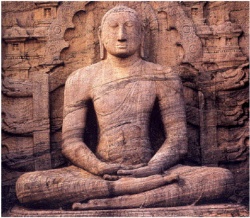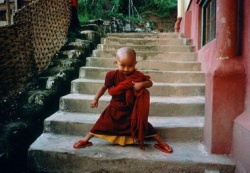Difference between revisions of "Siddhartha Gautama Buddha prophecies Jesus"
m (Text replacement - "authority" to "authority") |
m (Text replacement - "mortal" to "{{Wiki|mortal}}") |
||
| Line 34: | Line 34: | ||
[[Siddhartha Gautama]] was born on the edge of the Persian [[Empire]], in northeast [[India]] in 563 B.C. In 534 B.C., at the age of 29, [[Siddhartha]] left the protection of his father's castle to explore the [[world]] and seek [[truth]]. This was shortly after Daniel began to administer the regions near his home. Soon Darius, the Persian emperor, issued a decree that in every part of his kingdom [[people]] must {{Wiki|fear}} and reverence the [[God]] of Daniel. | [[Siddhartha Gautama]] was born on the edge of the Persian [[Empire]], in northeast [[India]] in 563 B.C. In 534 B.C., at the age of 29, [[Siddhartha]] left the protection of his father's castle to explore the [[world]] and seek [[truth]]. This was shortly after Daniel began to administer the regions near his home. Soon Darius, the Persian emperor, issued a decree that in every part of his kingdom [[people]] must {{Wiki|fear}} and reverence the [[God]] of Daniel. | ||
| − | In 531 B.C. [[Siddhartha Gautama]], [[Buddha]], began his own special ministry. [[Buddha]] always claimed to be a mere man and recognized that [[sin]] [[offered]] a significant problem for himself and other | + | In 531 B.C. [[Siddhartha Gautama]], [[Buddha]], began his own special ministry. [[Buddha]] always claimed to be a mere man and recognized that [[sin]] [[offered]] a significant problem for himself and other {{Wiki|mortal}} men. |
{{R}} | {{R}} | ||
[http://letsrollforums.com/siddhartha-gautama-buddha-prophecies-t23271.html?s=deb654351f7c923d7aff9720b7098486& letsrollforums.com] | [http://letsrollforums.com/siddhartha-gautama-buddha-prophecies-t23271.html?s=deb654351f7c923d7aff9720b7098486& letsrollforums.com] | ||
[[Category:Buddhist Terms]] | [[Category:Buddhist Terms]] | ||
[[Category:Buddha Shakyamuni]] | [[Category:Buddha Shakyamuni]] | ||
Revision as of 20:42, 12 September 2013
Near his death (483 B.C.) Buddha (The Enlightened One) told his followers, "Regardless of how many laws you have kept, or even if you pray 5 times a day, you cannot be free from your sin. Even though you burn yourself, even though I become a hermit, or am reborn another 10 times, I also shall not be saved." (Manuscript, Praising Temple, Chiengmai Thailand).
Buddha taught that he was not a "god", but only a man, a truth seeker. But on his death bed Buddha taught that there would be a future Messiah, "Lord of Mercies", who would be able to free men of their sins. Buddha said, "...He is the Lord of Mercies, His name shall be called the King of Kings, the Lord of Lords. He is all knowing, all wise. He knows all that is in the human heart. He is Lord of all the angels and of all humans. No one is greater than He." (Sutrapridot 3:107).
Buddha continued to teach of the Lord of Mercies, that "...His side has a wound where he was pierced, and his forehead has many scars. He will carry you to heaven where you will find the triune God. Thus give up following the old way. A spirit from heaven will come and dwell in your heart." (Manuscript, Praising Temple, Chiengmai, Thailand).
Jesus, later, fulfilled all of these prophesies. The awesomeness of the revealed Christ should call all peoples to submit to his rule. He is the only one under heaven through whom we can be saved.
In view of Buddha's familiarity with the coming King of Kings, one must wonder if the Magi of Matthew 2 were Buddhist priests. There is a different, late, seemingly foundless, tradition that the Magi were of mixed races and nationalities. The mixture is hardly supported by the scripture's description of "Magi from the east," who avoid Herod and secretly return to "their country."
In ancient writings, Magi actually refers to a tribe of the Medes that were known for being warriors and priests at the same time. Bardiya, a Magi, raised a rebellion against Cambyses, the son of Cyrus, during the life time of Buddha (521 B.C.). Zoroaster also belonged to this tribe.
PROPHESIES OF BUDDHA'S ANCESTORS AND DISTANT RELATIVES
In 2513 B.C. Noah exited the Ark. He told his sons that the descendants of Japheth (Europeans and Mongolians) would extend their territory and live in the house of Shem. He said that the descendants of Shem (Southern Asians, Jews, and Arabs) would have a special relationship with God. In contrast, Ham was warned that the descendants of one of his sons (Canaan) would be the lowest of slaves. Siddharta descended from Shem. Some of the other descendants of shem were used by God to write the Bible.
Moses wrote the first five books of the Old Testament(1500-1461 B.C.). He told of the coming of a great Jewish prophet. Anyone who did not listen to him would be called to account before God. King David wrote the book of Psalms(1064-1024 B.C.) and prophesied that the great king, prophet, messiah that was to come from his lineage would, in his death, have his hands and feet pierced. The guards would divide his garments and cast lots for his raiment. This messiah's soul was not to be left in the grave, and his body was not to see decay. The Messiah was to be seated at the right hand of God and given rule and authority.
Isaiah, another descendant of Shem, prophesied (740-712 B.C.) that the coming great one would be called wonderful counselor, mighty God, prince of peace. His power was to be in his mouth and the words he spoke. He would be despised, forsaken and a man of sorrow. He was to be born of a virgin, do miracles, healing the sick. Lead like a lamb to the slaughter, he would be slain for our iniquities. A book was to be given to lead people out of darkness and gloom. People from all nations were to flow into His kingdom.
THE RELATION OF DANIEL AND BUDDHA
It was with this great prophetic background that Daniel (Belteshazzar) was carried into captivity by the Babylonians (606 B.C.). When Daniel interpreted Nebuchadnezzar's dream, revealing that the Medes and Persians were to conquer Babylon, he was elevated to chief administrator of the empire. He had also revealed that the Medes and Persians were to be conquered by the Greeks, and the Greeks by the Romans. During the Roman rule God was to set up his own kingdom (the church) that was to grow and fill the earth.
God used Daniel as a great prophet. Measuring from Ezra's return to Jerusalem, Daniel revealed the great Messiah was to come in 26 A.D. and leave 3 1/2 years later. After that a prince (Titus) was to destroy Jerusalem.
The Medes and Persians then conquered Babylon in 538 B.C. and shortly thereafter elevated Belteshazzar to be the chief administrator of their empire.
Siddhartha Gautama was born on the edge of the Persian Empire, in northeast India in 563 B.C. In 534 B.C., at the age of 29, Siddhartha left the protection of his father's castle to explore the world and seek truth. This was shortly after Daniel began to administer the regions near his home. Soon Darius, the Persian emperor, issued a decree that in every part of his kingdom people must fear and reverence the God of Daniel.
In 531 B.C. Siddhartha Gautama, Buddha, began his own special ministry. Buddha always claimed to be a mere man and recognized that sin offered a significant problem for himself and other mortal men.

